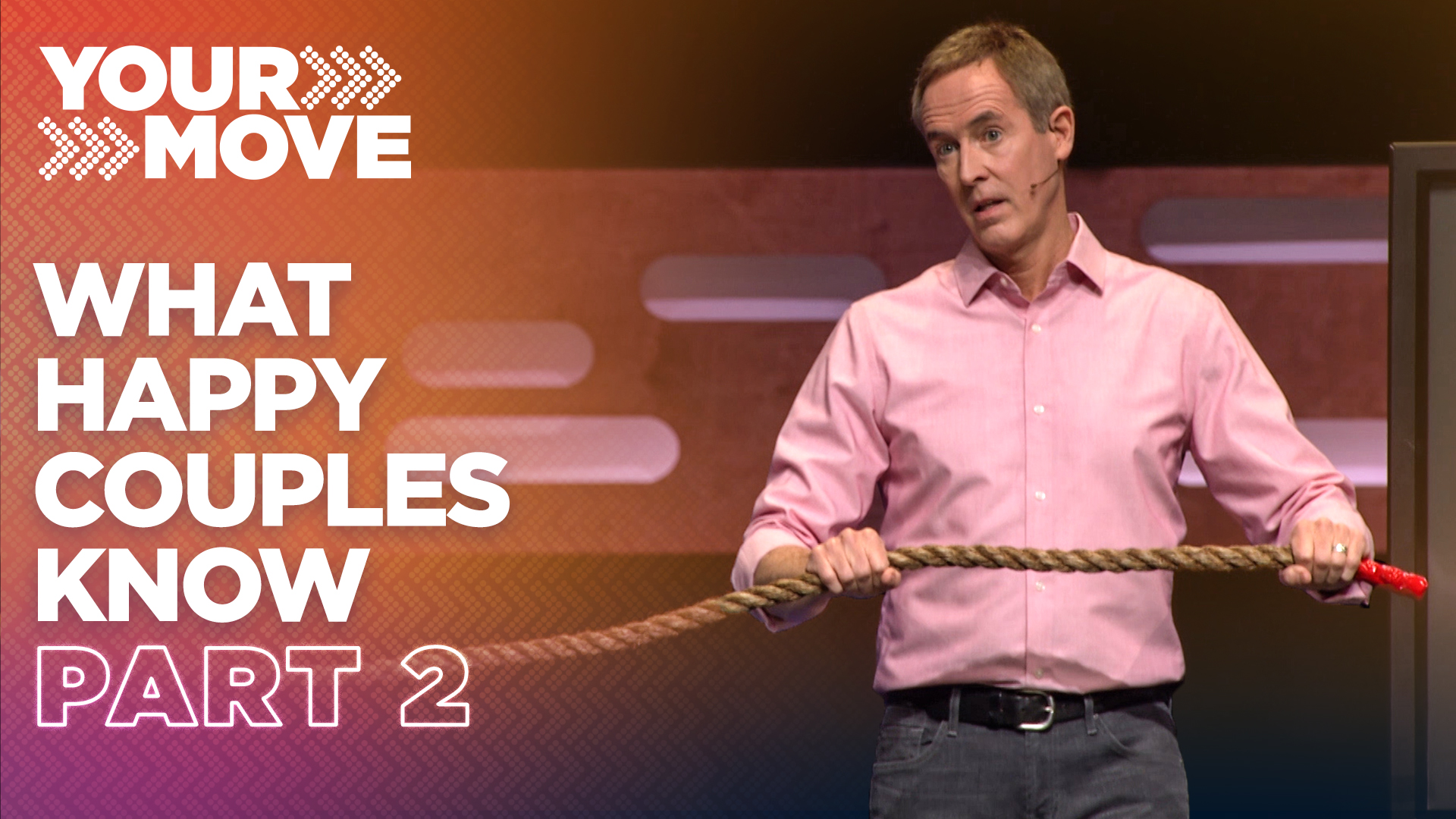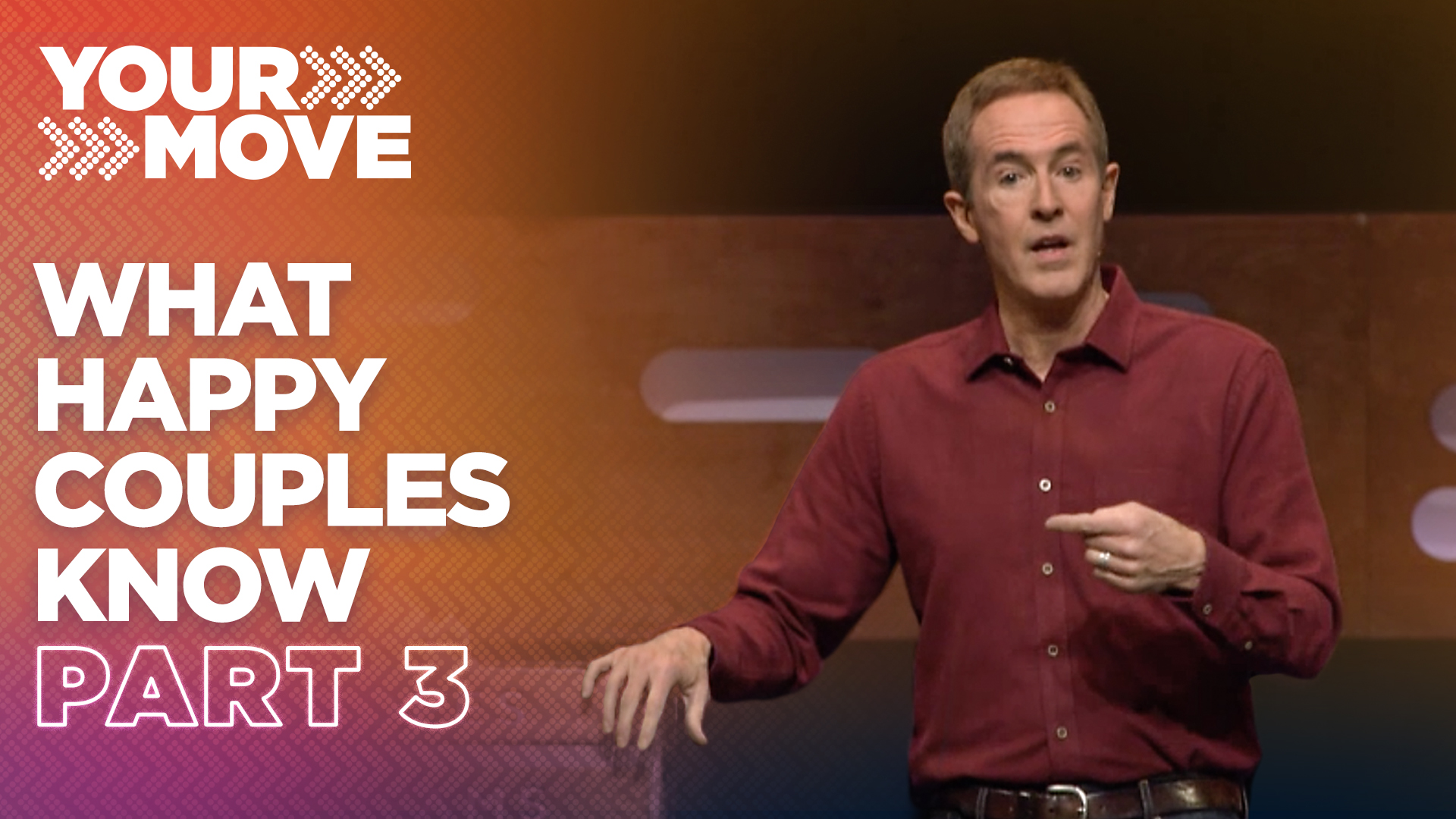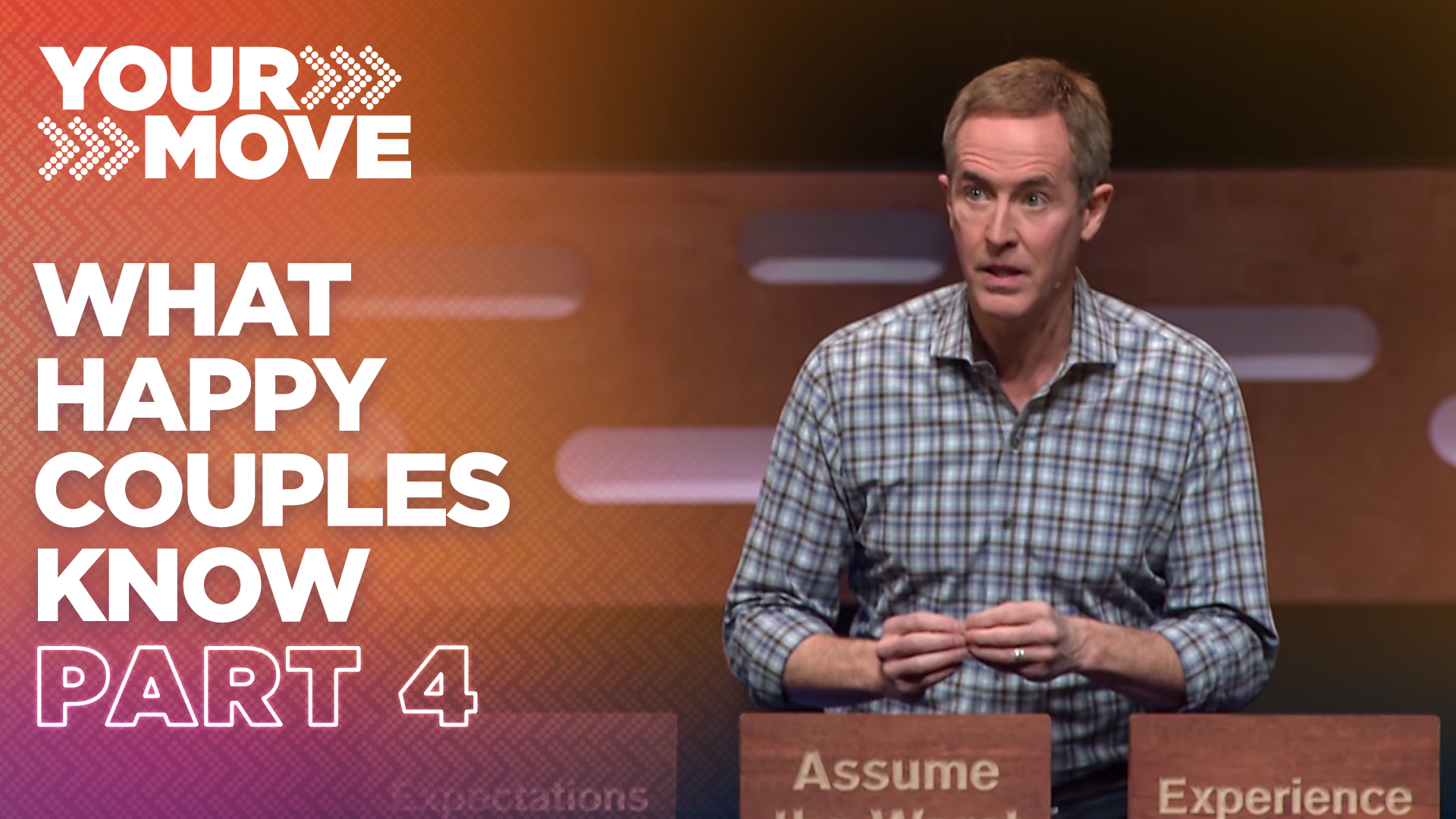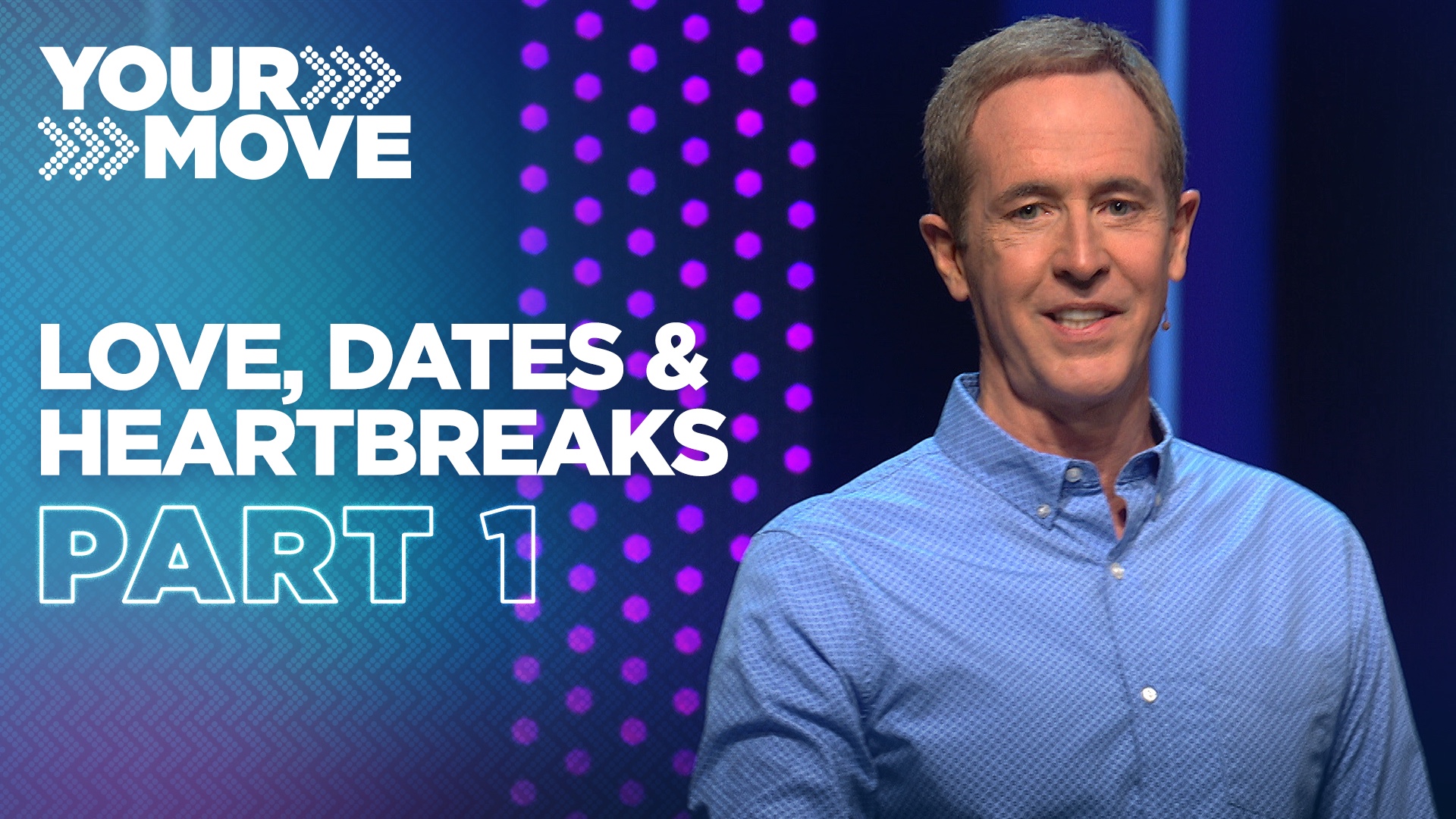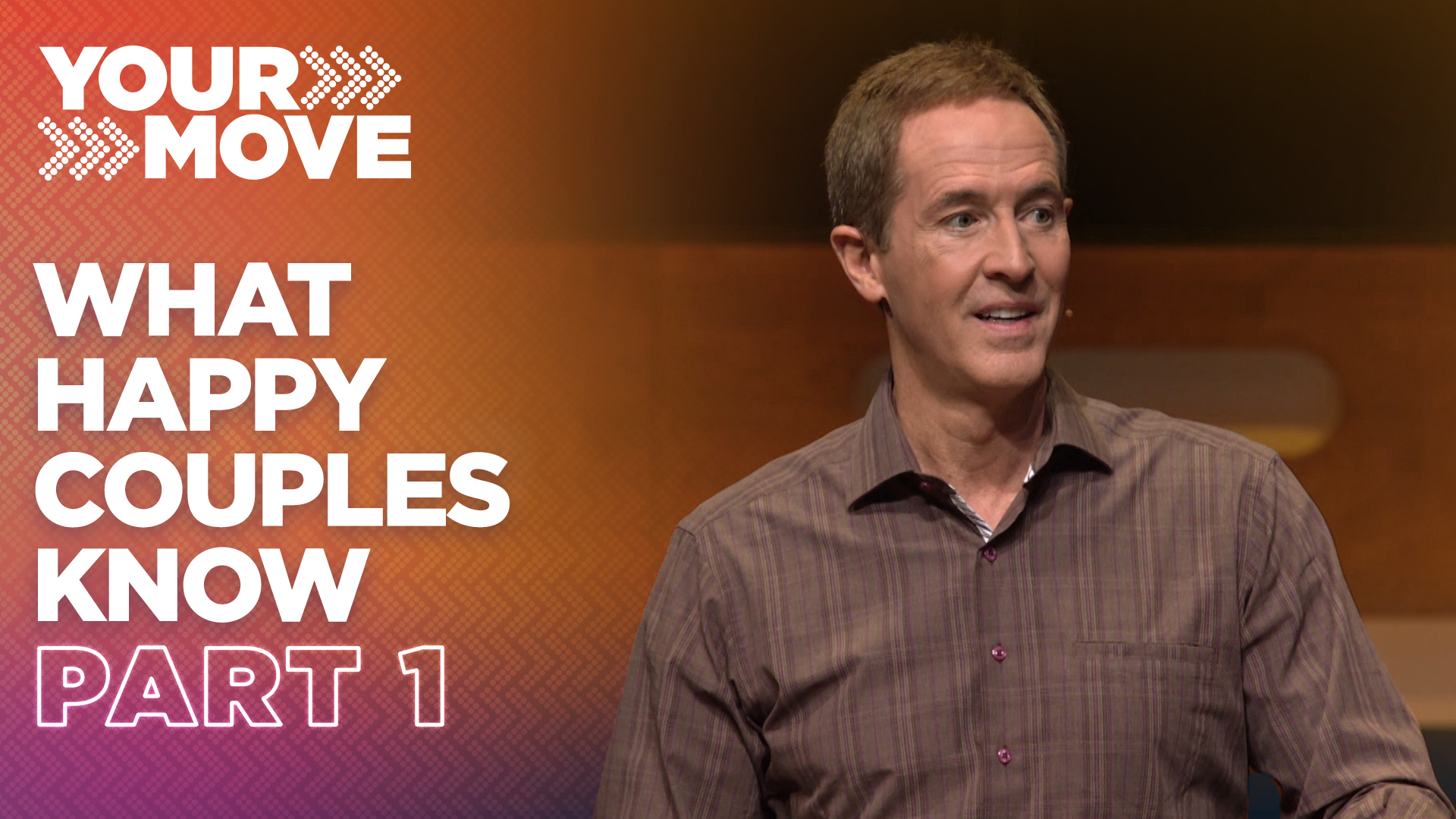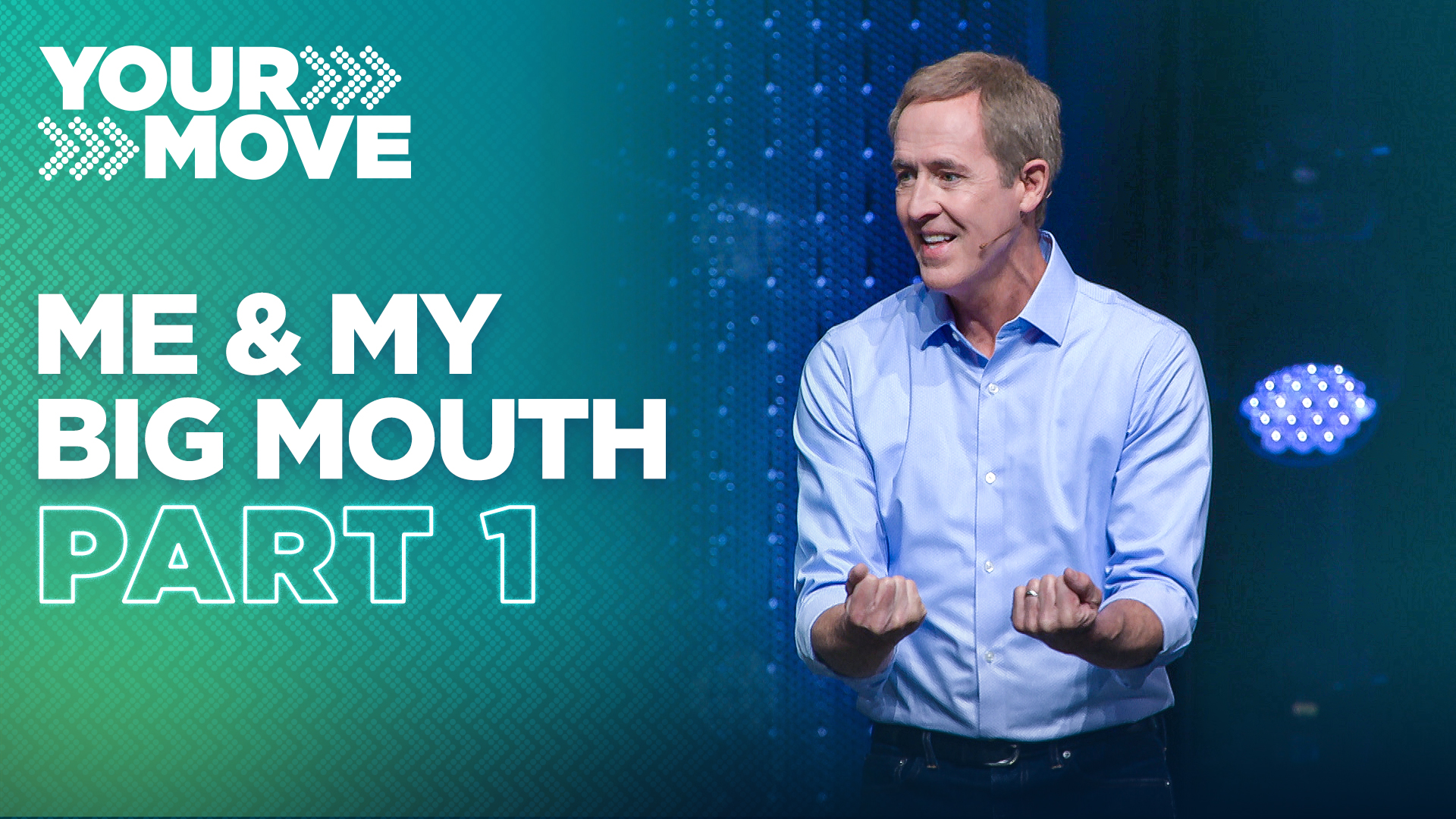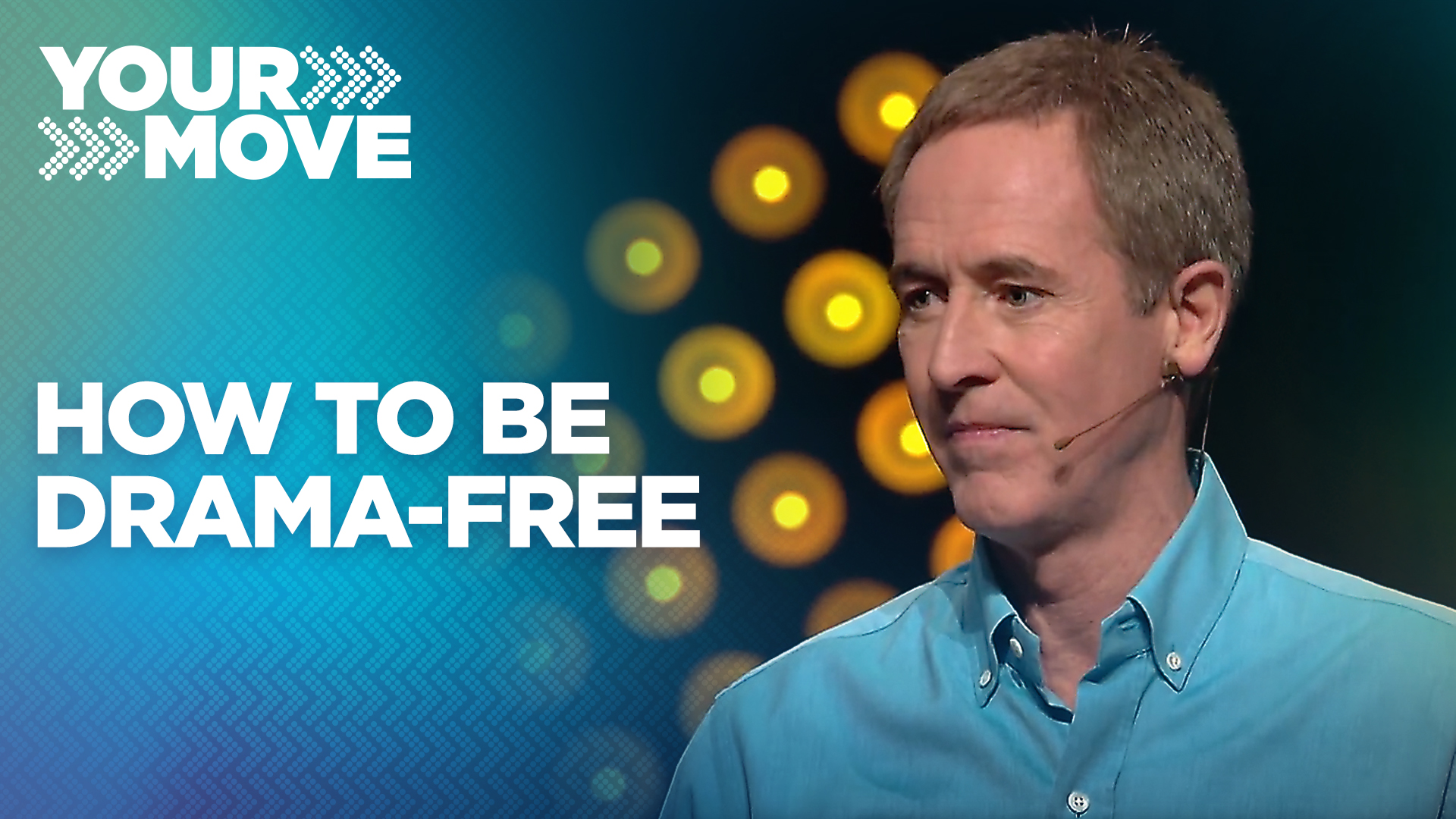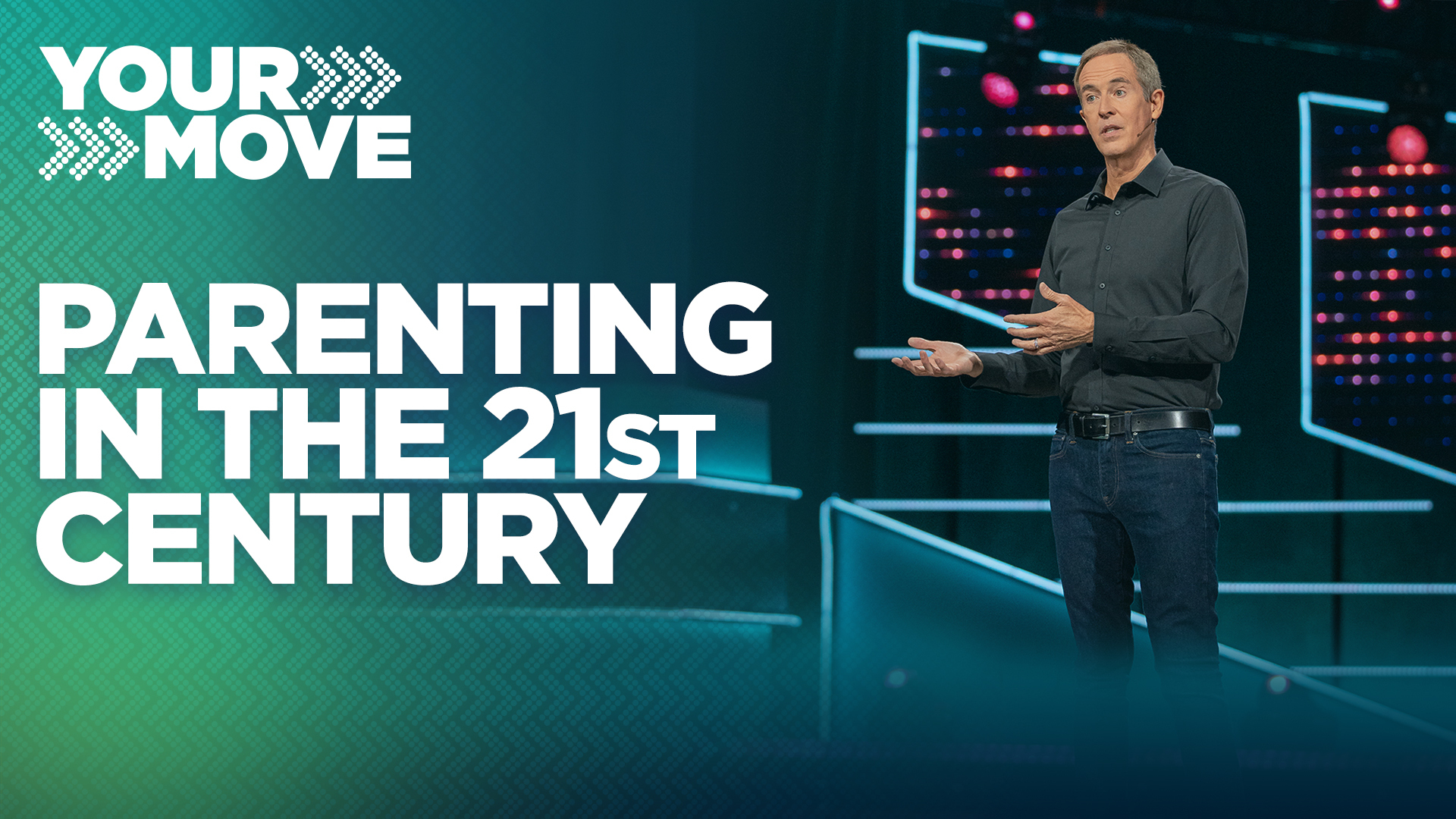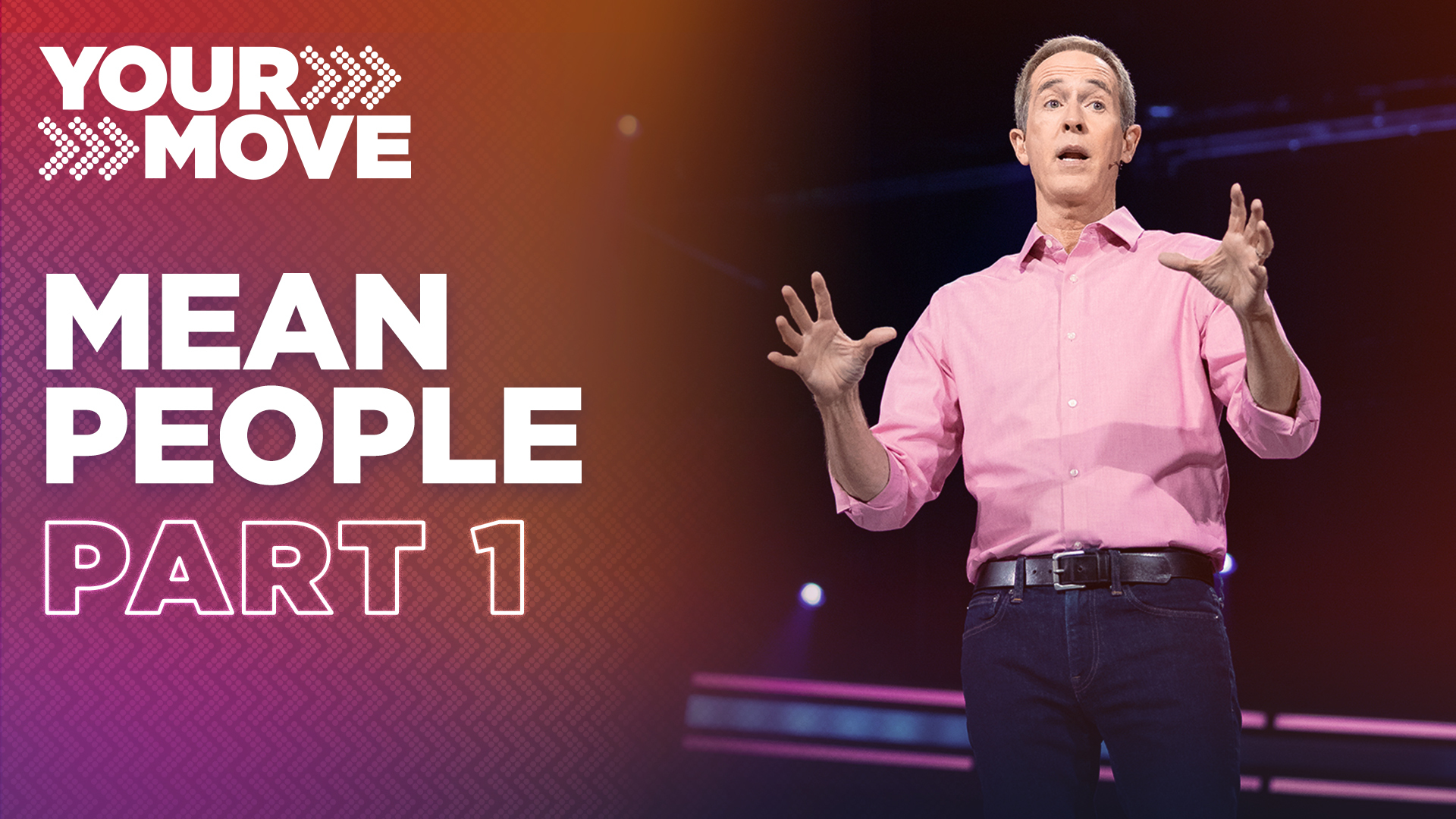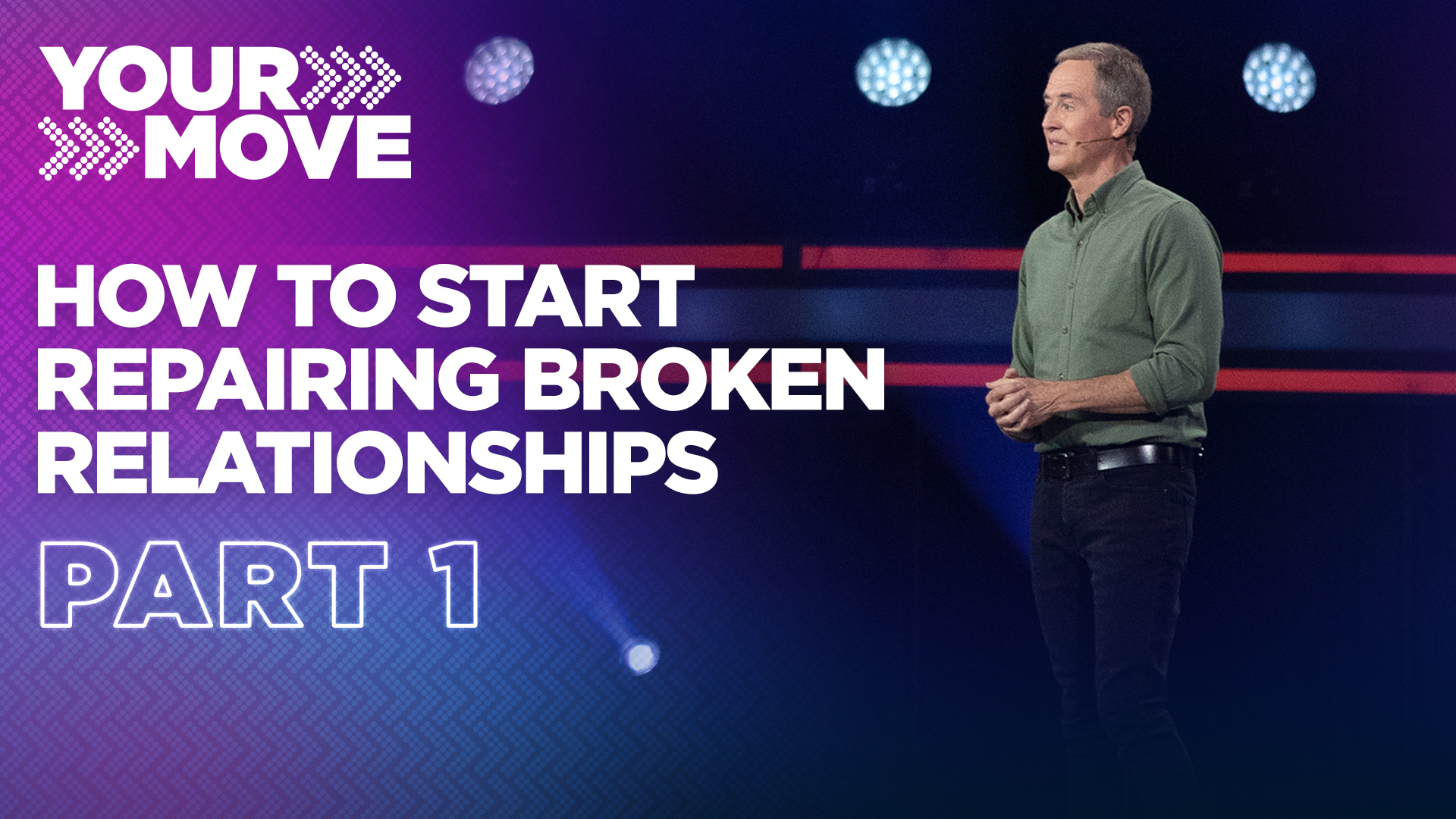A great relationship doesn’t happen by accident. Happy couples know that the secret lies in addressing the hopes, dreams, and desires of both people.
- Take a few minutes to write down some of your hopes, dreams, and desires for a past, current, or future relationship.
- Is there a time in your life when you expected your partner to fulfill your hopes, dreams, and desires? Has someone ever expected certain things from you?
- When you run into conflict in a relationship, is your tendency to leave, try to win, conform, or compromise?
- Do you think marriage is about compromise? Why or why not?
- Andy explained that marriage is Jesus’ invitation to love others the way he loved us. Could viewing marriage as a “submission competition” improve your relationship?
NOTE: The following content is a raw transcript and has not been edited for grammar, punctuation, or word usage.
When it comes to relationships, when it comes to relationships, all of us have a box, an invisible box of hopes, dreams, and desires. If you’re single and not dating anybody, this is a very undefined box. The things in this box are very undefined for you. But as you move into a relationship or as you think about moving toward a significant relationship, these become more defined. You have some hopes, you have some dreams, you have some wishes, you have some desires as it relates to a future relationship. If you’re engaged, hopefully, you’ve already talked about what is in your box and you’ve heard from your fiancé what’s in their box. If you’re married, if you’re married, you should definitely know what’s in your spouse’s box, and some of you do, and some of you don’t, which is part of the problem. But we all have hopes, dreams, and desires.
When we think about the future, we all have some hopes, dreams, and desires as it relates to this stuff right here: Money. “We’re gonna have a lot of money,” or, “We don’t need a lot of money,” or, “Love will keep us alive.” “We’re gonna have a single income.” “I’m gonna be a stay-at-home mom.” “I’m gonna be a stay-at-home dad.” “Maybe we’ll just have so much money we can both just stay at home.” “We’re gonna have a budget.” “We’re not gonna have a budget. You have all these ideas, but you have some expectations. You have some hopes and dreams as it relates to your financial future.
You have some ideas about if you get together, and if you fall in love and get married someday, somehow all the chores are gonna get done, and you think about how it happened in the family, your family of origin, or you think about the way that should happen, or the way you dream about that happen. You’re gonna have lived in some sort of thing. You’re gonna rent, you’re gonna lease, you’re gonna purchase, you’re gonna keep driving the sports car forever. Maybe you’ll talk him or talk her into trading her sports car for something more practical. You probably, when you think about your future, you wanna have a child. If you’re an only child, you’re thinking, “I don’t wanna have an only child. I wanna have some children. But if I have two girls, we’re gonna keep going until we get a boy.”
[laughter]
“And why not just have a basketball team?”
[laughter]
You’ve got some hopes and dreams as it relates to those things. You got a mental picture of what scheduling in a relationship’s gonna be like, how we spend our discretionary time, our free time. “I get to spend time with my friend, you spend time with your friends.” “No, we spend all of our time together.” “No, I don’t want you to meet my friends.” There’s hopes, and dreams, and expectations as it relates to time. And then there’s hopes and dreams as it relates to the calendar.
And this was a big discussion for us too, because Sandra, she was so fair. She said, “I only want three holidays and your family can have all the rest.” She said, “Our family will take… We’ll spend Thanksgiving, and Christmas, and Easter with my family.”
[laughter]
“And you get Halloween, Groundhog Day.”
[laughter]
Anyway, but you have a picture of how all of that… “This is how it’s all gonna work out.” “This is how we’re gonna live the dream.” And this is… Every guy has some idea of what he hopes and dreams that his wife…
[laughter]
Will not wear to bed.
[laughter]
And she’s thinking, “But he just wants me to be comfortable. He doesn’t care.”
[laughter]
“He accepts me just the way I am. He’s gonna accept me just the way I am, that those sorts of things won’t even matter.” And then, of course, there’s conflict resolution, because you gotta resolve conflict in a marriage, or in a relationship. Initially, there’s conflict in just about every relationship. And so the expectation is, or the thought is, “Well, we’ll just talk it all out, and get everything out on the table, and just be completely honest. And maybe somebody else is thinking, “No, no, no, that’s how you hurt people’s feelings. You don’t say everything that’s true. You just make sure that what you say is true.” And then some guys are thinking, “Conflict resolution? I thought that’s what sex was for.”
[laughter]
Then there’s this big one, that I don’t even have something to illustrate it, and that’s basically, “How are we gonna treat each other?” “How am I gonna behave toward him?” “How is she gonna behave toward me?” “How am I gonna behave ‘when?’ ” “What do I expect?” “My husband, or my fiancé, my girlfriend, she’s never gonna say… She’s never gonna use this term. She’s never gonna threaten.” There’s just an expectation. You may have never defined it. In fact, I think most people don’t. But you have a pretty clear expectation about how you will be treated in this very, very significant relationship. “If she loves me, he would never.” “If he loves me, he’ll never.”
Now, there are several things that impact what we put in our hopes, dreams, and desires box, and we all have a box. There are several things that impact that. One of the things that impact that, is what we’ve seen and what we’ve heard. What you’ve seen, maybe in other relationships, what you’ve seen modeled, what you saw the folks next door, what you’ve read, what you’ve seen, what you’ve seen in culture. But primarily, the thing that impacts what we put in our box, is really what we’ve experienced. And for many of us, it’s what we experienced in the home we grew up in, that our hopes, and our dreams, and our desires… And this is such a big deal, and it’s complicated, and it’s emotional… But most of our hopes, dreams, and desires are a response to what we grew up in and what we grew up around.
We are either trying to avoid something or we’re trying to recreate something. And maybe it wasn’t your parents, maybe your older brother or sister has a fabulous relationship, and you’re like, “That’s the kind of relationship I wanna have.” I’m not simply trying to avoid something. I’m trying to repeat something. I’m trying to recreate something. But even in those situations, where we are trying to recreate something great, even in those ideal situations, where we’re trying to recreate something that’s healthy, that’s worth recreating, in the middle of all of this is me. Because these are my hopes, and these are my dreams, and these are my desires. And At some point in the relationship, while you’re dating, once you get engaged, maybe at the altar, maybe a month after you’re married, maybe a year after you’re married, at some point along the way, we can’t help ourselves, we essentially take our box of hopes, dreams, and desires, and we say, “Here, make ’em come true. Make them come true. This is what I always dreamed it would be like. This is what I hoped it would be like. The reason I pursued you, the reason that I walked down the aisle with you, is because, in my mind, this is what the future looks like, and I need you to come through for me.” But the challenge is, and the problem is, and the tension comes, when we hand somebody our box of hopes, dreams, and desires. It doesn’t feel like hopes, dreams, and desires to them, does it? To them, it feels like expectations. To them, it feels like a weight. To them, it feels like the bar has been raised. To them, it feels like a homework assignment. To them, it feels like a responsibility. To them, it feels like, if they don’t come through, you might be disappointed with them.
Expectations are simply this: A strong desire, or a strong belief, rather, that something will happen. “Now, it may not happen in the first month, it may not happen in the first year, but one day, we’ll get there. Aren’t we, honey? We will get there one day, won’t we?” The strong belief that something will happen or that it will be the case in the future. “It’s not our dream home, but we’re working toward that.” “He hasn’t gotten rid of that yet, but he will.” “She hasn’t changed her mind yet, but she will.” “We haven’t gotten there yet, but we will.” “Won’t we? Won’t we? Won’t we?” It’s the strong belief that something will happen or will be the case in the future. But the problem is this and you’re smart enough to know this. I’m just putting words around things perhaps you’ve thought, and perhaps have felt, that attempting to recreate, attempting to recreate or avoid something from the past. Any time we attempt to recreate or avoid something from the past, it transforms hopes, dreams, and desires into expectations. So even in the best of relationships, even in the most ideal relationships, even when the best fall down some time, even when the wrong words seem to rhyme…
[chuckle]
Out of the doubt that fills my mind, I somehow, I’m so confused that this happened. I somehow find… We somehow find, what? That you and I, what?
Collide.
Collide. That’s right. See what I did there? Yeah.
[laughter]
And here’s the thing, when I’s collide, it’s not really that you and I collide, it’s I’s collide. And when I’s collide, we swap boxes. “I give you mine, you give me yours.” suddenly, it’s a burden to someone, and you’re handed their burden, their expectations as well. Now, when I’s collide, we do one of five things. And I wanna talk about the first four today for just a few minutes.
Now when I’s collide, we do one of four things. The most extreme thing is we leave. We just say, “You know what? That’s not what I had in mind.” “That’s not what I bargained for.” “I didn’t know, you didn’t tell me. I’ll never live up to what you want me to live up to. This will never be a reality for us and I don’t wanna live with the pressure. I can’t take the pressure, and so I’m out of here.” And you know what you do when you leave? [chuckle] You pick up your box of hopes, dreams, and desires, and you cart it off to the next relationship.
Second thing we do, if we don’t leave, is we win. A lot of us just wanna win. In every relationship, there’s generally a stronger personality, not always, but oftentimes, that’s the case. And in those situations, oftentimes, one person powers up, and they win. They leverage what I call the four Cs to an unsatisfying and dysfunctional relationship. You know what those are? The four Cs, I’ll show ’em to you real quick. If you wanna have a terrible relationship, here is the prescription right here.
[laughter]
You convince, you convict, you control, and you coerce. You convince, you know what we convince? We say, “Now, look, I realize, I realize this is how you thought it should be, but you’re wrong. I realize that this is how you always dealt with conflict in your family, but let me tell you how it’s gonna be. I realize you always dreamed about… I know. But see, honey, you have the wrong box. Yours is the bad box, mine is the good box.”
[laughter]
“My box is how the world works. This is the rational way to do it. This is the right way to do it. If you’ll just trust me, and live the life that I want you to live, and become more like me, you’ll be happier.” Because aren’t people always happier when they try to become like someone else? Of course. Don’t we always become happier when we throw away, and abandon who we are, and who God created us to be, in order to conform to the image of our partner? Of course. It is a recipe for happiness. “So, honey, if you will just abandon everything in your box and embrace mine, it’ll all work out.” And you convince, and you convict. You convict, ’cause you make ’em feel guilty. It’s like, “Okay, I don’t wanna be critical, but that’s just kinda dumb.”
[laughter]
“I don’t wanna be critical, but did that work out for your parents? And we control, and we coerce. And at the end of the day, here’s the interesting thing, the winner, the winner is happy. The winner’s happy. In fact, they’re always grinning at me. Life is great. They’re living out their dream, and they’ve got somebody to help them live out their dream, and they can’t quite figure out what’s wrong with her, and what’s wrong with him, but, “He’s coming along.” “She’s doing a lot better.”
[laughter]
“Just pray,” because I’m happy, ’cause we got two people working out of my box. And they ultimately, and eventually, conform to the image of your box, which, of course, this is the correct box. This is the right way to do things.
The third response is just a flip side to the person or the opposite to the person who wins. The third response is we’re the conformer. We become somebody we’re not to compensate for somebody who won’t love us. We become somebody we’re not to compensate for someone who will not accept us as we are. We abandon who we are, in order to embrace what makes another person happy, regardless of whether or not it works for us, and works with us. We just basically conform. And conforming works for a while. It really works for the person who won. But it works for the person who conformed as well, because the temperature goes down in the relationship. The tension goes down in the relationship. But in the end of the day, at the end of the day, when somebody in a relationship is simply giving up who they are to become somebody that they’re not, at the end of the day, they lose respect for their partner and their partner loses respect for them.
And then the fourth response is the most common response. We just compromise. In fact, I think for many people, they think this is the goal, that this is the win. This is how you stay married, you just compromise. And perhaps, you saw this with your parents. Your parents weren’t unhappy. They weren’t real happy, they just got along, they just worked it out. Or maybe you’ve even said, “My parents, they eventually… They just figured it out.” Because in the compromised marriage, “I’m gonna do my part and you do your part. And I’m gonna keep an eye on you to make sure you do your part, and I know you’re watching me to make sure I do my part.”
Within a compromised marriage, there’s score-keeping. Everybody’s keeping score, everybody’s keeping a record. It’s a bit contractual. We agree, “This year was my year with my family. Next year is your year with yours. And don’t even bring up next year, ’cause we’ve already decided. I don’t care what’s happening
“We’re gonna be with my family no matter what, because we… ” Come on. “We already decided. We’ve already worked this out.” And this kind of relationship, whether it’s a dating relationship, engaged relationship, marriage relationship, there’s low trust. In fact, the trust continues to get lower, and lower, and lower. And where there’s low trust, there’s low intimacy. Here’s why. You cannot be actually intimate with anyone you’re not willing to fully give yourself to, and you will not fully give yourself to someone you don’t completely trust.
In fact, you can’t give yourself fully to someone you don’t completely trust. If you’re single, and you wanna know the secret to great sex and marriage, it has nothing to do with sex. It has nothing to do with anything physical. It has everything to do with intimacy, and intimacy is tied to trust, and in a relationship that’s characterized by any of these things, and maybe, perhaps, especially to this one, “Something begins to happen to me and it’s still physical, but it’s not amazing.” It’s not intimacy, because everybody is a little bit on-guard, lest they be taken advantage of, and it’s ultimately very unfulfilling. It’ll work. You can go the distance. You can end your life together, but there’s a better way. And the other thing about compromise is this. This is a subtle thing. At the end of the day, a compromised relationship is fueled by a commitment to the wrong thing.
This sounds bad when I say it, but we’ll talk about it. It’s actually fueled by a commitment to the relationship. In fact, you may have said this before, you’ve heard someone say this before. You’ve heard somebody say, “I’m committed to my marriage. I’m committed to my marriage.” And this sounds good, but nobody marries a marriage. Nobody dates a relationship. Nobody is engaged to a relationship. There is another name in the equation.
And this is not a bad thing. In fact, if you only get this far and you finish together, that’s good. Being for marriage is better than being against marriage. And wanting your marriage to be a good marriage, is certainly better than not wanting your marriage to be a good marriage, but there’s something beyond that, because there is another face, and there is another name, there is another person in the equation besides you. And at the end of the day, this will work, but it’s not all that much fun, and it’s not all that fulfilling. So when I’s collide, when I’s collide, we leave, we try to win, we conform, or perhaps, we compromise. But when I’s collide, for sure, we loses.
Now, as I said, there’s another option, and the fifth option is what happy couples know, and we’re gonna spend next week, the entire time, talking about that fifth option, But for the next few minutes, I wanna frame the problem in a way that’ll help you and help us understand exactly where we’re headed for the next few weeks.
Let me frame this one more time in a little bit different way and we’ll wrap this up. Expectations, expectations create, in any relationship… In any relationship, expectations create a debt-debtor relationship. In other words, whenever I put all my hopes, wishes, and dreams on you, and expect you to do something for them, in that moment, I live under the assumption that now you owe me. See? You now, I’ve committed my life to you, you’ve committed your life to me, or we’re moving toward committing our lives to each other, which means these are my hopes, dreams, and desires, and now that I’m handing them to you, this is what you owe me. You are in debt to me. You owe me attention. You owe me
to fully resolve the conflict. You owe it to me to make sure that I enjoy of how we do the calendar, and the money, and the travel, and everything else. You owe me affection. You owe me to pay the bills. You owe me to provide for me. You owe me. And I owe you.
How much gratitude… Because this is a big part of the equation. This is a big part of the tension… How much gratitude, how much gratitude do you express to people who pay you what they owe you?
How much gratitude do you express to people who do what they’re supposed to do, who give what they’re supposed to give, who simply provide the service they’re supposed to provide How much gratitude do you express to that person? The answer is minimal. Minimal. We rarely express gratitude for what we’ve come to expect. Now, here’s the tricky part about being with the same person for many, many, many years. In every relationship and every marriage, you get into a routine, which is fine, you have to have routines.
But when you or when I come to expect from someone what they’ve always done, when it comes down to me, expecting Sandra to do what Sandra’s always done, the gratitude is going to be minimal, which communicates, “This is what I expect all along. I’m not gonna thank you when you do it, but I’m gonna ask you when you don’t.” I’m not gonna say, “Wow, I’m surprised. Thank you for doing that, even though you do it every single day,” or every single Thursday, or every single, whatever the routine is. But if I don’t, if I get so accustomed to that, that I come to expect it, that I quit expressing gratitude for it… ‘Cause here’s what gratitude is and this is something you can start today.
Gratitude says, “I didn’t expect that and I’m grateful for it.” I’m telling you this is how you supercharge and this is how you fuel healthy relationships, because gratitude is an indication I’ve not filled up a box full of expectations. The other thing about this whole debt-debtor thing that is so insidious, and again, you don’t see it happening, you just wake up one day, and you ask yourself, “What’s wrong? How do we get here and why isn’t it the way it used to be?” That a debt-debtor relationship eliminates, and this is interesting, a debt-debtor relationship, it actually eliminates the possibility, it eliminates the possibility of unconditional love. Because if you owe me, you can’t love me. In fact, “owe me” eliminates “love me.” If I owe you flowers… If I owe Sandra flowers… “Well, it’s Valentine’s, where are the flowers?” “Here’s the flowers.” “Alright, well, we’re back to zero.” I made it. “Well, it’s my birthday, where’s the card and the gift?” I got the card and the gift. “Well, thank you.” Or if it’s the other way around, “Well, it’s Christmas, where is my gift?” “Oh, we’re back to zero.”
If I owe you, I can’t love you, because love requires margin. Love does not do well in an environment of expectation. In an environment of expectation, it’s almost impossible to recognize love. In fact, expectations… We’ll put this next screen up here… Expectations actually remove the margin necessary to love, for love to be recognized and appreciated. You can’t even see it when it’s happening. Why? “Because it’s what I expected. It’s what I’m accustomed to. That’s what I’m used to.” “She always does.” “He always does.” “My father always did.” “My mother always did.” “It’s what women are supposed to do.” “It’s what men are supposed to do.” “It’s what couples are supposed to do.” It’s a “supposed to do” thing. And, “He’s meeting the expectations.” “She’s meeting the requirement.” “Why would I be overwhelmed with gratitude?”
And you’ve eliminated… This is a powerful thought… You’ve eliminated the potential for love to even be recognized or expressed. This is why a box full of expectations undermines intimacy in a relationship, because this feels like pressure every single day of the week.
Here’s the question. What should we do? What should we do with our hopes, dreams, and our desires? What should we do with ’em? Do we just pretend? “I never wanted children.” “I don’t care how we spend our time.” “I have no vision at all.” “We don’t even have to live indoors. It doesn’t matter to me.”
[laughter]
“It’s okay if we never leave the city limits.” “I don’t care what I drive.” “I’ll do all the work.” “Who needs money? Love will keep us alive. We don’t need any of that.” What do you do with all of this? Ignore ’em? No. Deny them? No. For some of you, you’ve spent years filling up this box and you know what? Much of what is in this box are good things, in fact, it’s probably all good things. In fact, some of these things stem from the fact that you bear the image of God. But what do we do with this, just feel guilty about it? Pretend, hide, ignore, lie? The short answer is, you keep ’em in this box, which leads to the next question: How do you do that? How do I keep this stuff here, and not put it over there, and hand it to the person that I wanna spend the rest of my life with? How do I keep these things in the box? [chuckle] And the short answer to that question, is the correct answer to this next question. And this next question will bother you, and it’ll bother you, because you know the answer to this question. This is something that happy people know. This is not intuitive. This may make you run for the hills. But this is a game-changing idea and I certainly didn’t originate it.
The best way to keep hopes, dreams, and desires in the hopes, dreams, and desires box, and out of the expectation box, is to ask this question: What do they owe you? What do they owe you? What do they owe you? And happy couples know that the answer to this question is “nothing.” Happy couples know that they owe each other everything, but are not owed anything in return, which doesn’t make any sense, so I’m gonna say it again. Happy couples know that they owe each other everything, but they’re not owed anything in return. It doesn’t make any sense, but let me tell you about the happiest couples you know. There’s something about them that doesn’t make any sense. It’s true. They go through hard times and they’re happy. It doesn’t make any sense. They’re not fabulous, incredible, talented, rich people, and they’re just happy, and it doesn’t make any sense. Some of ’em have a lot of kids, and some of ’em weren’t able to have kids, and they’re happy, and it doesn’t make any sense. There’s something about extraordinarily happy couples that’s always a mystery and I’m telling you what part of the mystery is. They live every day under the assumption that they owe each other everything and they don’t expect anything in return.
Now, Christians, Christians, and I think many, many happy couples leverage a very, very Christian principle, but happy Christian couples, they take their cue from Jesus’ one all-encompassing command. When Jesus was at the end of His ministry years, He got His guys together and He said, “Now, look, when we started off together, there was 630-something Jewish commands, I reduced ’em down to two. Now, right before I go, I’m gonna reduce ’em down to one. John, write this down, ’cause you’re only gonna have to remember one thing. You ready, John? Here we go.” Here’s what He said, “As I’ve loved you, you’re to love one another.” In the old days, it was, “Do unto others as you would have others do unto you.” Okay, those days are gone. This is better. “As I’ve loved you, so you are to love one another.”
And then the Apostle Paul comes along after that. Here’s what he wrote. I love this. He said, “To all Christians everywhere,” he said, “Walk in the way of love, just as… ” And throughout Paul’s teaching… This is so powerful… Throughout Paul’s teaching, you see these two words, because Paul says, “As a follower of Jesus, in every relationship, in every situation, we take our cue from our Savior. I want you to walk in the way of love.” What does that look like? “Just as Christ loved us and gave Himself up for us.” And couples take this idea, and they drop it into their center of the relationship, into the center of this dynamic with all the potential tension. And when they do, marriage begins to look like a submission competition, a race to the back of the line, which sounds miserable, which is why so few try it, but those who do, enjoy it. It’s one of the things that happy couples know.
Now, we’re gonna pick it up right there next week, but I wanna give you two pieces of homework, they’re both just thought homework.
This is a ‘you’ question and here are my two questions, the first one is this: What’s in your box? You should know the answer to that, you should know. One of the reasons you accidentally apply pressure to the the person you love, is because you’re not clear about what’s in here, and it’s not clear to them, and it’s a fog, and it’s confusing, and they’re constantly trying to know how high to jump, and how low to duck, and it’s just not clear. What’s in your box? You should know that. You should maybe write it down. If you’re single, not even in a relationship, you should start thinking about this question, because eventually, you’re gonna bring a box to somebody. You just are, we just do.
And the second question is this, and this is maybe the more important question: Are you expecting someone to carry it around for you? Have you handed this off intentionally or unintentionally? What’s in your box and have you handed it off to somebody else to carry?


